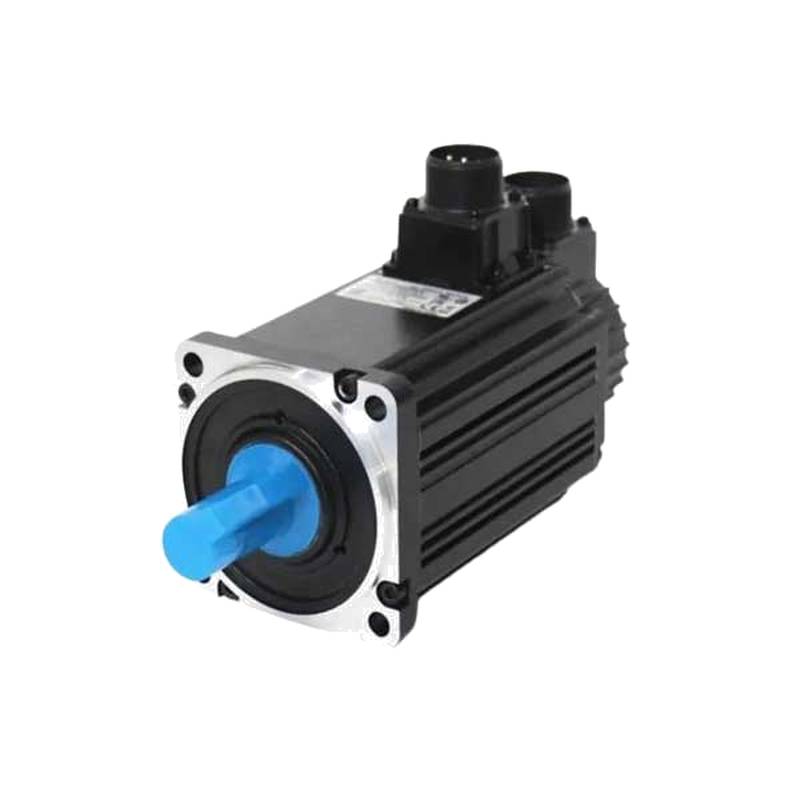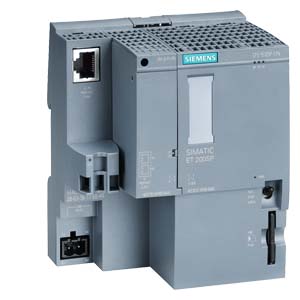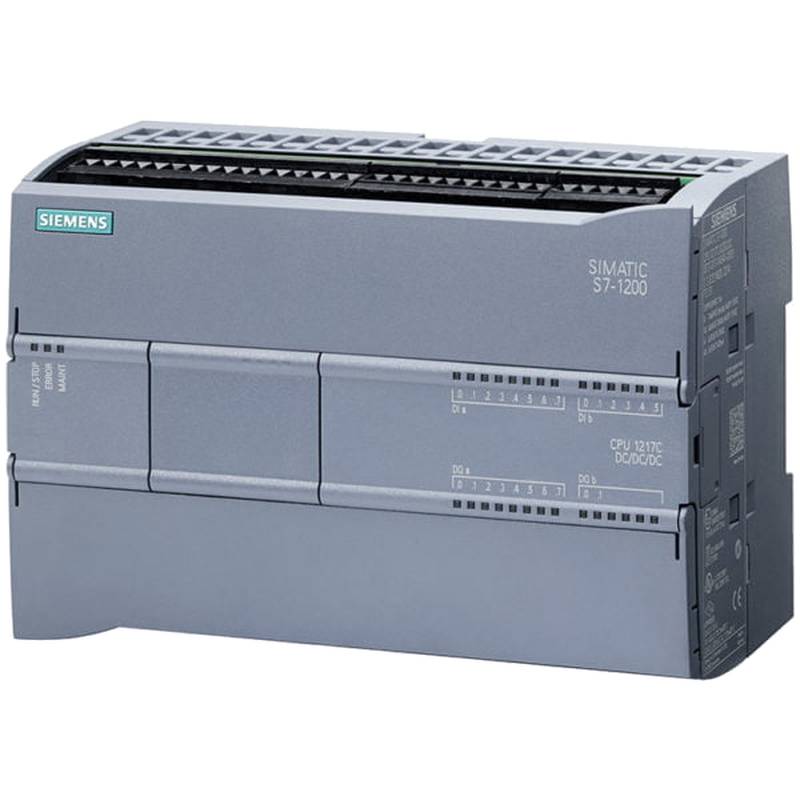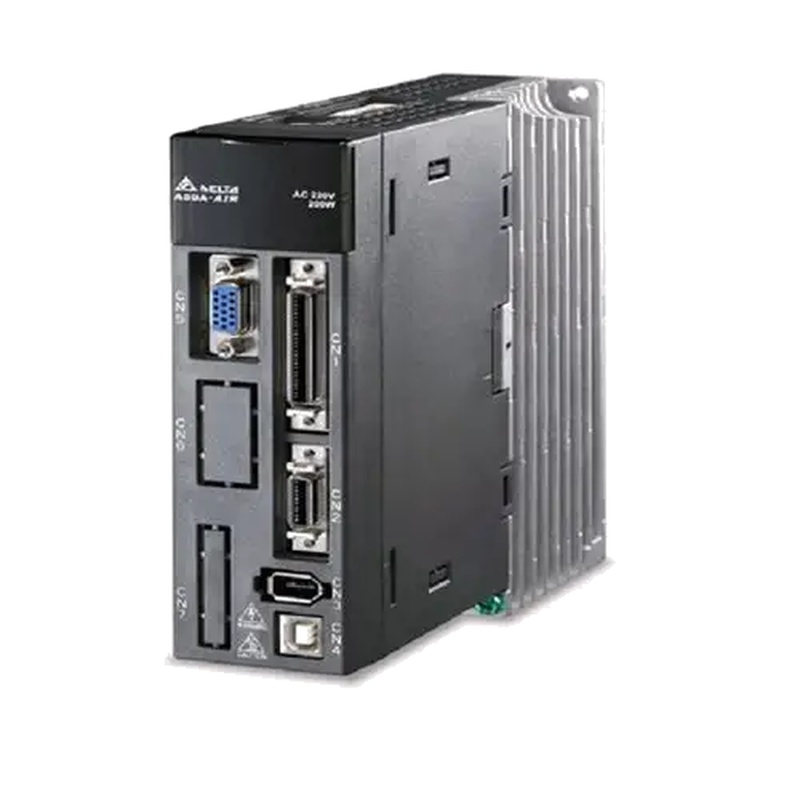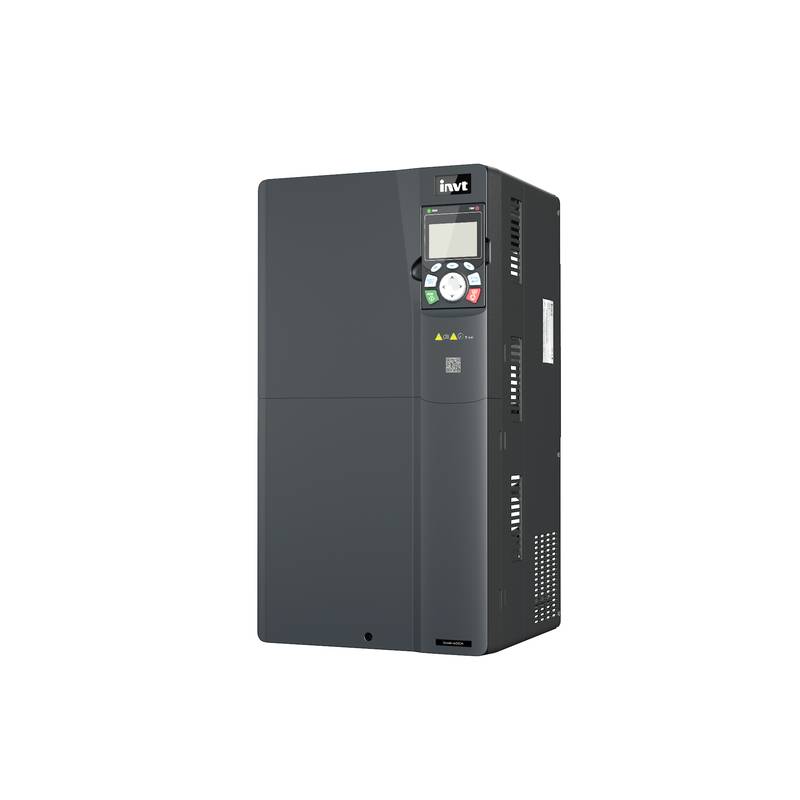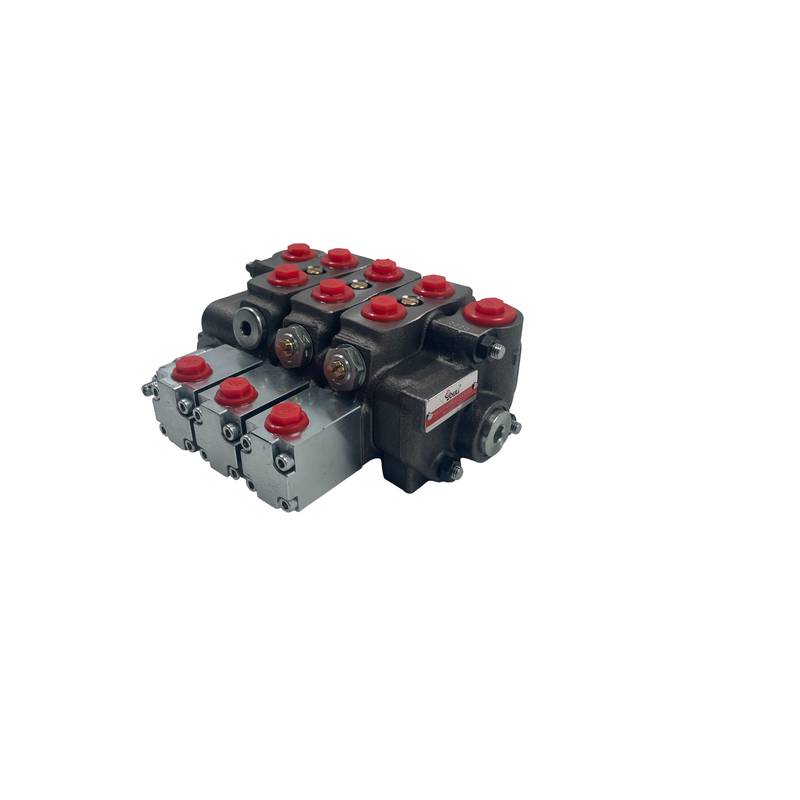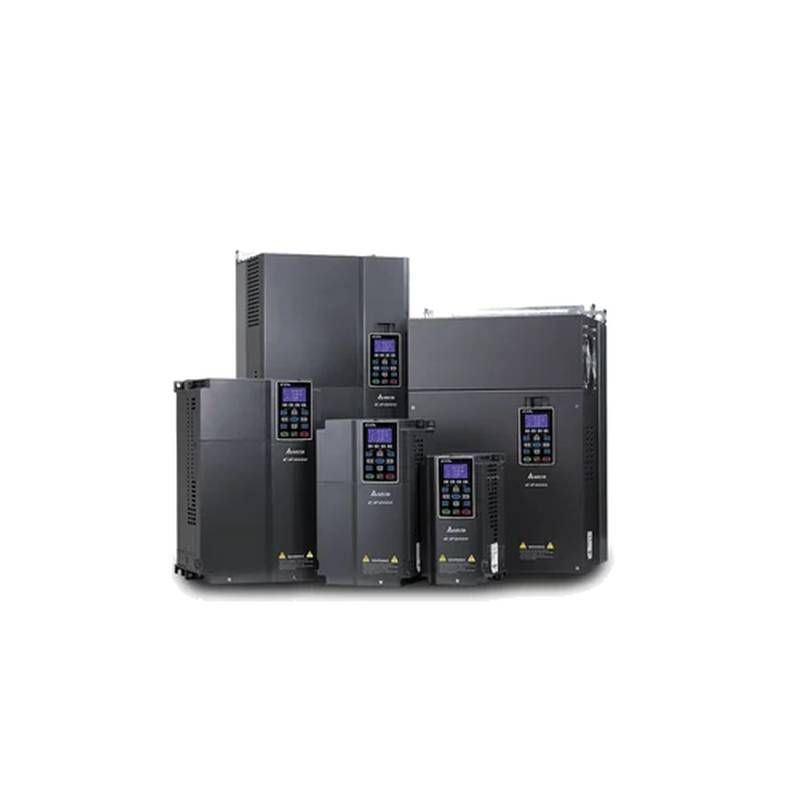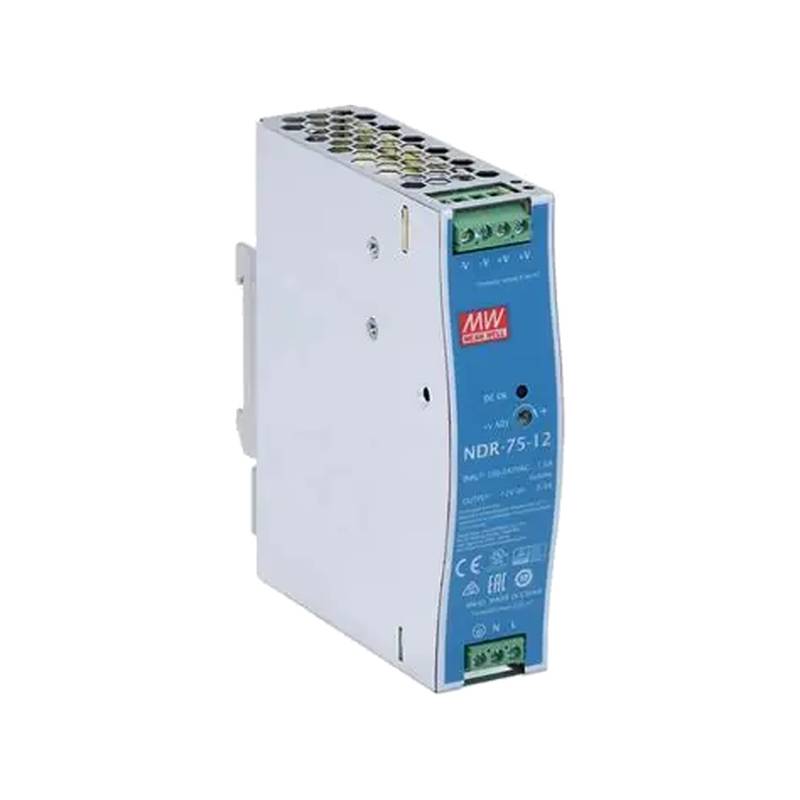
The Delta ECM-B3L-CA0401SS1 brake resolver servo motor is a high-performance motion control component engineered for precision and reliability in demanding industrial applications. This servo motor boasts a 100W power output, a rated torque of 0.32 N-m, and operates on a 220 VAC supply, available in single or three-phase configurations. Its compact design, coupled with a 24-bit encoder resolution and integrated brake, ensures accurate positioning and holding capabilities. The ECM-B3L-CA0401SS1 is part of Delta's ASDA-B3 series, renowned for its high response bandwidth, precise motion control functions, and user-friendly operation, making it a robust solution for automated systems requiring speed and accuracy.
Product Specifications
| Feature | Specification |
| :----------------------- | :--------------------------------------------- |
| Model | ECM-B3L-CA0401SS1 |
| Series | ECM-B3L Low Inertia Motor Series |
| Rated Output Power | 100 Watts (0.1 kW) |
| Rated Torque | 0.32 N-m |
| Voltage | 220 VAC (Single/Three Phase) |
| Output Current | 0.9 Arms |
| Drive Resolution | 24-Bit |
| Encoder Type | Incremental |
| Motor Frame Size | 40 |
| Brake | Yes |
| Rated Speed | 3000 RPM |
| Maximum Speed | 6000 RPM (Field weakening area) |
| Rotor Inertia | 0.037 x 10⁻⁴ kg-m² |
| Communication | Compatible with ASDA-B3 servo drive |
| Dimensions | 40 x 40 mm (Flange size) |
| Weight | Not specified |
| Protection | Not specified |
| Operating Temperature | Not specified |
| Storage Temperature | Not specified |
Core Features & Market Positioning
The Delta ECM-B3L-CA0401SS1 positions itself as a premium solution within the industrial automation market, competing on precision, performance, and integration capabilities. Its core strength lies in the combination of a low inertia motor for rapid response and a high-resolution 24-bit encoder, enabling extremely accurate positioning. The integrated brake is a critical differentiator, providing secure holding torque when power is removed, essential for vertical axis applications or applications where load holding is paramount. Compared to previous Delta series like ECMA, the ECM-B3L offers improved performance, including a higher maximum speed and increased short-term torque boost, alongside a more compact design for easier integration into space-constrained machinery. Its compatibility with the ASDA-B3 servo drive series further enhances its market appeal, offering a cohesive system solution for advanced motion control.
Key Application Scenarios
This servo motor is ideally suited for a diverse range of industrial automation tasks where high precision, rapid acceleration/deceleration, and reliable holding are critical. Common applications include:
Machine Tools: For precise movements in CNC machinery, grinding, and milling operations requiring consistent speed and accurate path control. Robotics: Enabling intricate movements in robotic arms for pick-and-place operations, assembly lines, and automated inspection systems, particularly where vertical load holding is necessary. Semiconductor Manufacturing: Facilitating high-precision wafer handling, positioning, and assembly processes where even micron-level accuracy is essential. Packaging Machinery: Ensuring synchronized movements for high-speed filling, labeling, and sealing operations, optimizing throughput and product quality. Printing and Labeling Equipment: Delivering precise registration and high-speed control for accurate print placement and efficient labeling. Automated Assembly: Providing controlled motion for intricate assembly tasks in electronics manufacturing and other precision industries.
Practical System Integration Guidance
Integrating the Delta ECM-B3L-CA0401SS1 servo motor into a system typically involves pairing it with a compatible Delta ASDA-B3 series servo drive. The motor connects to the drive via dedicated power and encoder cables. Wiring should be managed carefully to avoid electromagnetic interference; shielded cables are recommended. The ASDA-B3 drive offers flexible communication options, supporting pulse (STEP/DIR) commands for CNC applications and RS-485 MODBUS for integration with PLCs and other control systems. Delta provides specialized software, such as ASDA-Soft, for configuring parameters, performing auto-tuning, and monitoring system performance, simplifying the commissioning process. For applications requiring enhanced safety, the ASDA-B3A series drives offer STO (Safe Torque Off) functionality, contributing to SIL2 safety standards when used with an appropriate safety relay.
Operation and Risk Mitigation
Safe and effective operation of the Delta ECM-B3L-CA0401SS1 servo motor hinges on adherence to proper installation, parameter settings, and operational procedures. The integrated brake is a key safety feature, automatically engaging to hold the motor shaft when power is removed. This is crucial for preventing unwanted movement, especially in vertical applications or during power outages. Users should consult the ASDA-B3 series servo drive manual for detailed parameter configurations, as incorrect settings can lead to performance issues or safety hazards. Regular inspection of wiring, connectors, and the motor housing for signs of wear or damage is recommended to mitigate potential failure points. Troubleshooting guides within the drive manuals typically address common fault codes and operational anomalies, providing steps for resolution. When working with the motor and drive, always follow standard industrial safety protocols, including ensuring proper grounding and lockout/tagout procedures during maintenance.
Scalability & Long-Term Value
The Delta ECM-B3L-CA0401SS1 servo motor is designed to integrate seamlessly into evolving automation infrastructures, offering significant long-term value. Its compatibility with the broader ASDA-B3 series of servo drives and motors allows for easy system expansion and upgrades, supporting multi-axis configurations and advanced control strategies. Delta's commitment to developing intelligent servo systems means that these motors can be readily incorporated into IIoT (Industrial Internet of Things) frameworks, enabling predictive maintenance, remote monitoring, and performance optimization through data analytics. Furthermore, the backward compatibility with previous Delta servo system components, as seen with the ASDA-B3 series' compatibility with ASDA-A2 and ASDA-A3, can simplify upgrade paths for existing Delta installations, preserving investment in control platforms.
Frequently Asked Questions
What are the primary advantages of the Delta ECM-B3L-CA0401SS1 servo motor?
The Delta ECM-B3L-CA0401SS1 offers high precision due to its 24-bit encoder and rapid response from its low inertia design. It features an integrated brake for secure load holding, crucial for vertical applications and safety.
The motor also benefits from improved performance over older generations, including higher maximum speed and increased torque boost capabilities. Its compact size simplifies integration into various machinery designs.
These advantages combine to deliver enhanced productivity, reduced cycle times, and reliable operation in demanding industrial automation tasks.
How does the brake function in the Delta ECM-B3L-CA0401SS1 servo motor contribute to its applications?
The integrated brake provides essential holding torque when the motor is de-energized, preventing gravitational drift in vertical axes. This is vital for safety in automated systems and during maintenance procedures.
It ensures the load remains stationary, minimizing positional errors and preventing damage to workpieces or equipment. This feature is particularly advantageous in applications like robotics and material handling.
The brake mechanism offers an added layer of reliability, ensuring positional integrity even in the event of a sudden power loss, thus enhancing overall system safety and stability.
What are the key technical specifications to consider when integrating the Delta ECM-B3L-CA0401SS1 servo motor?
Key specifications include its 100W rated power, 0.32 N-m rated torque, and 220 VAC operating voltage. The 24-bit encoder resolution ensures high positional accuracy.
Consider the motor's frame size (40) and shaft diameter for mechanical compatibility with your drive system and driven load. The low inertia characteristic is important for applications requiring fast dynamic response.
Always ensure compatibility with the chosen Delta ASDA-B3 servo drive for optimal performance, considering factors like current ratings, communication protocols, and encoder feedback type.
What applications benefit most from the Delta ECM-B3L-CA0401SS1's brake and low inertia features?
Applications involving vertical axes, such as pick-and-place robots, material lifts, or dispensing systems, greatly benefit from the holding torque provided by the integrated brake. This ensures stability and prevents unintended movement.
Industries requiring rapid acceleration and deceleration, like high-speed packaging machinery, automated assembly lines, or dynamic CNC operations, will leverage the low inertia design for faster cycle times.
Any scenario demanding precise positioning with dynamic load changes, or where safety protocols require guaranteed holding under power loss, is a prime candidate for this servo motor.
How does the 24-bit encoder resolution of the Delta ECM-B3L-CA0401SS1 compare to older models?
The 24-bit encoder offers a significantly higher resolution, providing 16,777,216 pulses per revolution compared to older 17-bit encoders (160,000 pulses/rev). This translates to vastly improved positioning accuracy and smoother low-speed operation.
This increased resolution allows for finer control over motion, reducing potential errors and enabling more precise movements in sensitive applications like semiconductor manufacturing or advanced machine tools.
The leap in encoder technology ensures that the ECM-B3L-CA0401SS1 can meet the stringent accuracy demands of modern automated systems, offering a significant performance upgrade.
What are the power and torque ratings of the Delta ECM-B3L-CA0401SS1 servo motor?
The Delta ECM-B3L-CA0401SS1 servo motor is rated at 100 Watts (0.1 kW) of output power. Its rated torque is 0.32 Newton-meters (N-m).
These ratings indicate its suitability for moderately demanding applications where compact size and precise control are prioritized over high power output. It is part of Delta's low inertia motor series.
While the rated torque is 0.32 N-m, it can handle higher short-term torque increases (up to 350% boost) for rapid acceleration and deceleration phases.
Can the Delta ECM-B3L-CA0401SS1 servo motor be used with Delta servo drives other than the ASDA-B3 series?
While primarily designed to integrate seamlessly with the ASDA-B3 series drives for optimal performance, some older Delta servo motors were compatible with previous drive generations. For the ECM-B3L series, compatibility is strongest with the ASDA-B3 and ASDA-B3A drives.
Using it with incompatible drives may result in limited functionality, reduced performance, or potential system errors. It is always recommended to consult the specific drive's documentation for compatibility confirmation.
Delta offers a range of servo drives and motors, and selecting a matched pair from the same series (like ASDA-B3 with ECM-B3L) guarantees the best integration and achievement of the system's performance specifications.
What are the typical communication protocols supported for controlling the Delta ECM-B3L-CA0401SS1?
Control of the ECM-B3L-CA0401SS1 servo motor is typically managed through its paired Delta ASDA-B3 servo drive. These drives commonly support STEP/DIR (Pulse Control) for CNC applications and RS-485 MODBUS for communication with PLCs and industrial networks.
The drive also facilitates analog voltage control (0-10V) for speed or torque commands, offering flexibility in how external controllers interact with the servo system. USB connection is usually available for parameterization and configuration using Delta's software.
These communication options provide engineers with versatile methods to integrate the servo motor into various automation architectures, from standalone CNC machines to complex networked factory systems.
What is the significance of the "resolver" in the context of Delta servo motors like the ECM-B3L-CA0401SS1?
While the ECM-B3L-CA0401SS1 is specified with a 24-bit incremental encoder, Delta's broader servo motor range can include resolvers as feedback devices. Resolvers are robust sensors providing rotor position and speed data.
Unlike encoders, resolvers have no electronic components, making them highly resistant to vibration, shock, and extreme temperatures, ideal for harsh industrial environments. They offer excellent reliability and are immune to electrical noise.
Resolvers utilize electromagnetic principles to determine rotor angle, offering a durable and precise feedback mechanism crucial for closed-loop servo control in demanding applications where encoders might fail.
How does the compact size of the ECM-B3L-CA0401SS1 benefit machine design?
The ECM-B3L-CA0401SS1 servo motor is designed to be more compact than previous Delta AC servo motor generations. For example, a 100W motor with a 60x60mm flange size is approximately 31% shorter.
This reduction in size allows for more densely packed machine designs, enabling smaller overall equipment footprints without compromising performance. It provides greater flexibility in integrating the motor into tight spaces.
Machine builders can achieve improved ergonomics, increased operational capacity within a confined area, and potentially reduce material costs associated with larger enclosures or mounting structures.














